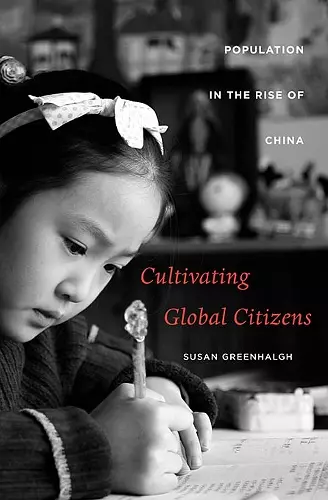Cultivating Global Citizens
Population in the Rise of China
Format:Hardback
Publisher:Harvard University Press
Published:14th Nov '10
Currently unavailable, and unfortunately no date known when it will be back

In this wide-ranging and impressive work, Greenhalgh examines the evolution of China's population policy in the post-Mao era. She notes that during the past thirty years the role of the state in managing China's population and the bodies of its citizens has expanded enormously, involving efforts to promote women's health, foster higher population 'quality,' and even combat infertility. If we want to understand the challenges that China's rise presents to the rest of the world, we need to appreciate the centrality of all aspects of population management in the strategic thinking of Chinese elites. Cultivating Global Citizens provides a vital guide to this controversial terrain. -- Martin K. Whyte, editor, One Country, Two Societies: Rural-Urban Inequality in Contemporary China
Accounts of China's global rise emphasize economics and politics, largely neglecting the cultivation of China's people. This title by focusing on the decade since 2000, and especially 2004 - 09, argues that the vital politics of population has been central to the globalizing agenda of the reform state.
Current accounts of China’s global rise emphasize economics and politics, largely neglecting the cultivation of China’s people. Susan Greenhalgh, one of the foremost authorities on China’s one-child policy, places the governance of population squarely at the heart of China’s ascent.
Focusing on the decade since 2000, and especially 2004–09, she argues that the vital politics of population has been central to the globalizing agenda of the reform state. By helping transform China’s rural masses into modern workers and citizens, by working to strengthen, techno-scientize, and legitimize the PRC regime, and by boosting China’s economic development and comprehensive national power, the governance of the population has been critically important to the rise of global China.
After decades of viewing population as a hindrance to modernization, China’s leaders are now equating it with human capital and redefining it as a positive factor in the nation’s transition to a knowledge-based economy. In encouraging “human development,” the regime is trying to induce people to become self-governing, self-enterprising persons who will advance their own health, education, and welfare for the benefit of the nation. From an object of coercive restriction by the state, population is being refigured as a field of self-cultivation by China’s people themselves.
In this wide-ranging and impressive work, Greenhalgh examines the evolution of China's population policy in the post-Mao era. She notes that during the past thirty years the role of the state in managing China's population and the bodies of its citizens has expanded enormously, involving efforts to promote women's health, foster higher population 'quality,' and even combat infertility. If we want to understand the challenges that China's rise presents to the rest of the world, we need to appreciate the centrality of all aspects of population management in the strategic thinking of Chinese elites. Cultivating Global Citizens provides a vital guide to this controversial terrain. -- Martin K. Whyte, editor, One Country, Two Societies: Rural-Urban Inequality in Contemporary China
- Nominated for Joseph Levenson Book Prize 2012
- Nominated for Allan Sharlin Memorial Award 2011
ISBN: 9780674055711
Dimensions: unknown
Weight: unknown
156 pages